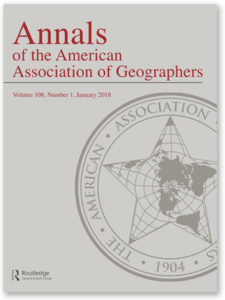Language Matters: Communications for Justice, Equity, Diversity and Inclusion

Caroline Nagel, JEDI Committee Chair
 Over the next several months, we’ll devote space in this column to the perspectives of JEDI Committee chairs as they continue implementing AAG’s Justice, Equity, Diversity, and Inclusion (JEDI) plan through the framework of TLC GRAM, which stands for Training, Listening, Communications; and Governance, Reports, Advocacy, and Membership. Caroline Nagel is the chair of the JEDI Committee and also chairs the JEDI Communications subcommittee.
Over the next several months, we’ll devote space in this column to the perspectives of JEDI Committee chairs as they continue implementing AAG’s Justice, Equity, Diversity, and Inclusion (JEDI) plan through the framework of TLC GRAM, which stands for Training, Listening, Communications; and Governance, Reports, Advocacy, and Membership. Caroline Nagel is the chair of the JEDI Committee and also chairs the JEDI Communications subcommittee.
As geographers, we are often reminded that geography means earth-writing. Put another way, we are in the business of words. The identification of communications as a pillar of the JEDI strategic plan acknowledges explicitly that our words are important—that the messages we convey among ourselves as geographers and to the rest of the world matter.
As chair of the AAG Justice, Equity, Diversity, and Inclusion (JEDI) Committee, as well as chair of its Communications subcommittee, I am charged with overseeing a process that has ever more importance: enhancing AAG’s capacity to achieve greater diversity, equity, and inclusion within the discipline, whether on college campuses, in private sector work, or in government agencies. Before I discuss some of the committee’s specific activities, I’d like to comment on the context in which we are doing our work.
 The weeks and months following the 2020 murder of George Floyd by police officers in Minneapolis saw an outpouring of public support for racial justice in the United States. America, it seemed, was ready for a long overdue ‘racial reckoning’. American corporations, government agencies, and academic institutions hurried to introduce an array of Diversity, Equity, and Inclusion (DEI) measures designed to address institutional barriers to equality.
The weeks and months following the 2020 murder of George Floyd by police officers in Minneapolis saw an outpouring of public support for racial justice in the United States. America, it seemed, was ready for a long overdue ‘racial reckoning’. American corporations, government agencies, and academic institutions hurried to introduce an array of Diversity, Equity, and Inclusion (DEI) measures designed to address institutional barriers to equality.
The backlash against DEI efforts, however, was swift, and, in hindsight, not entirely surprising. DEI opponents in ‘red’ states moved to cut spending on DEI activities at public universities, while well-financed conservative legal groups successfully challenged the vestiges of ‘race-conscious’ admissions policies.
As chair of the AAG JEDI Committee, I have watched these disheartening developments closely and have pondered what they mean for the AAG’s DEI efforts. In this fraught moment, my thoughts turn to how words are laden with political meaning. DEI opponents often argue that DEI, and the critical scholarship that underpins it, is a form of ideological indoctrination that limits freedom of thought and expression. Their response, ironically, has been to restrict or to eliminate narratives around race, gender, and sexuality that they associate with ‘wokeness’ and to replace them with other, more ‘acceptable’ narratives—for instance, that America is a colorblind society.
As the so-called ‘war on woke’ has gained momentum, some organizations wishing to preserve elements of their DEI programs have looked for new, less overt, ways to talk about diversity, equity, and inclusion. At my university, for instance, the administration preempted pressure from conservative legislators by folding DEI activities into a new Office of Access and Opportunity. Although this new office does much of the same work that the old DEI office did, I was struck by how our university president, in explaining the name change, emphasized outreach to first-generation students and to veterans and, in so doing, seemed to downplay the focus on students of color. This is not to discount the validity of any such outreach, but, rather, to indicate how certain signifiers of difference—especially of race—are viewed with suspicion despite evidence of their continued relevance in South Carolina and beyond.
While tactics to “rebrand” DEI may be prudent, we should be wary of backing off from the language associated with DEI. Justice, equity, diversity, and inclusion are not the buzzwords of some woke agenda; rather, they are terms that speak incisively to empirical realities. Take, for instance, the concept of ‘justice’, which has been part of the vocabulary of geographers for many decades. In some corners of the social media universe, the term ‘justice’ has taken on almost pejorative connotations—hence, the widely mocked figure of the ‘social justice warrior’. But how else are we to talk about the dumping of toxic waste in poor communities, the lack of public investment in affordable housing, the devastation of communities and environments caused by the extraction of resources, or the dire impacts of climate change on countries that have contributed almost nothing to global warming? If these aren’t matters of social justice, what are they?
This is not to say that concepts like justice, equity, diversity, and inclusion should not be held up to critical scrutiny. Geographers, for instance, have rightly been critical of diversity discourses in universities and other institutions, which often avoid substantive responses to systemic exclusions. But critiquing these concepts and demanding more of them is different from discrediting them altogether.
I would venture that for most geographers, it is an obvious statement of fact that the world is replete with social inequalities that are reproduced through political structures, institutional policies, and everyday behaviors. The aim of the AAG JEDI committee is to ensure that geography as a discipline can produce knowledge that captures these complexities; to do this, we need to acknowledge and to elevate perspectives and experiences that have typically been ignored; and we need to ensure that many different voices are shaping conversations within all disciplinary subfields.
Within the JEDI Communications Committee, we have focused on a heightened presence for JEDI activities on AAG’s social media and other platforms, as well as the work underway to help reorganize the AAG website and JEDI page so that they serve as a hub for JEDI-related resources and tools. This will involve collating resources from past DEI initiatives and making these resources more readily available for AAG members. It will also involve creating profiles of departments that have successfully recruited diverse groups of undergraduate and postgraduate students; posting curricular resources that emphasize critical geographical thought; providing curated lists of sources that explain community engagement; and short videos of AAG members who are making a difference in their institutions and communities. We also plan to post information about upcoming JEDI-related events (including AAG sponsored workshops and forums), and to highlight JEDI-focused conference sessions.
As we work toward the implementation of the JEDI strategic plan, we invite AAG members to get involved and to keep the principles of justice, equity, diversity, and inclusion at the center of our mission as geographers.
The AAG Culture of Care column is an outreach initiative by the AAG JEDI Committee. Don’t forget to sign up for JEDI Office Hours. The current theme of Office Hours is An Ethos of Care in the Research Enterprise.


